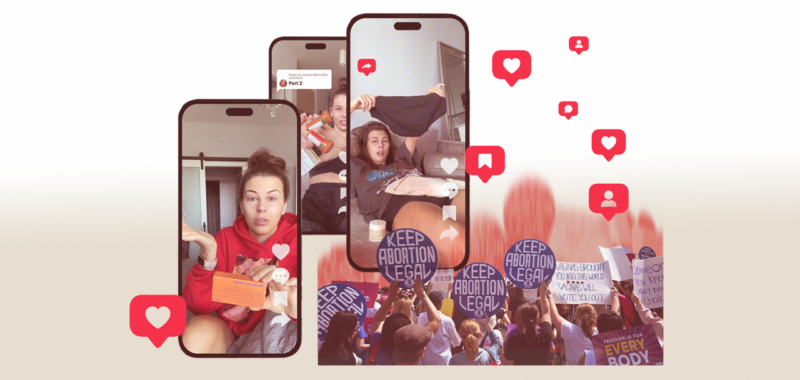Sunni, a 30-year-old living in Brooklyn, was one of these creators. She is calm and informative while taking you through her abortion journey in her video, which includes everything from cooking and DIY beauty to playing with her daughter. She also shares essential resources like how to access abortion medication in New York and by mail, Planned Parenthood hours, and information on abortion funds. The video also features real-time footage with a voiceover detailing her bodyâs reaction to the pill.
TikTok content
This content can also be viewed on the site it originates from.
âI filmed the vlog because, when I was going through the experience, there was a shortage of lifestyle vlogs that would walk you through the reality of the process,â Sunni tells Glamour, adding, âI also think reproductive health will always be a pertinent topic, even in a post-Roe era. We know that women have needed abortions for lots of different reasons, and right now, we need to work to help people access modern healthcare without criminalization.â
Like Sunniâs video, commenters on Wetzsteinâs video have shared how her perspective shifted their views on abortion. Some are currently navigating their own abortions or making plans, while others reflect on how her insights have helped them find peace after their procedures.
âYour self-assurance is truly healing to me,â one commenter writes to Wetzstein, while another expresses gratitude with, âThank you for making this video! I knew about abortion pills, but I had no idea how they worked.â
Thatâs what OBGYN Dr. Staci Tanouye says is so effective about videos like these.
âThey do a great job of sharing a true life experience honestly and without sensationalizing itâkeeping it real and not inducing fear,â says Tanouye, an OBGYN practicing in Florida. âNothing is fear-mongering about their videos; both normalize the abortion experience, which seems to be the intent.â
She adds, “Beyond that, theyâre incredibly educational.â Tanouye also notes that this is a common hope among practicing physicians: that conversations about women’s healthcare will be accessible, transparent and informative, and free from alarmism.
Take one video in the series, for example, where Jessica explains her abortion journey with the same clarity and conviction you might expect from a sex educator in a classroom or a doctor.
âIt’s only five pills. It’s a [medication] abortion,â she says. âYou can have this up to eleven weeks of pregnancy, and I’m only at five.”
She clarifies that this method is often confused with the morning-after pill or Plan B by commenters, which instead prevents ovulation and thus stops fertilization.
“But not only were people mixing the two up, but plenty of viewers were also saying to me, âI didnât even know [medication] abortion was an option,â” she saysâ a staggering realization when it is taken into account that 63% of all abortions in the US in 2023 were medication abortions.
Some commenters expressed surprise that the symptoms describedâcramping, bleeding, passing clotsâwerenât as excruciating as they anticipated. One commenter even noted their astonishment that Jessica could speak to the camera at all without, say, crying out in unbearable, excruciating pain.
According to Tanouye, itâs no surprise that misinformation is rampant everywhere, with social media serving as a potent amplifier.
âPlatforms with algorithms, like TikTok, are designed to push sensationalized content. Unfortunately, this includes misinformation about womenâs health,â says Tanouye, adding, âIn todayâs political climate, where womenâs health issues are often exaggerated, these platforms exploit that tendency, causing false information to spread like wildfire.â
The combination of a high-interest topic and the taboo around openly discussing women’s health creates a perfect storm for misinformation to thrive. And itâs not only TikTok that is a hotbed for inaccurate information surrounding abortion, itâs also deeply ingrained in the fabric of American politics. For example, during the 2024 presidential debate, Donald Trump suggested that after-birth abortions were a thing (yes, you read that right). This claim, which falsely refers to âpost-birthâ abortions, describes infanticide, which is not a legal practiceâ and is in no way anyone advocating for it to be. In fact, 93% of abortions occur in the first trimester, as seen in Wetzsteinâs experience.

